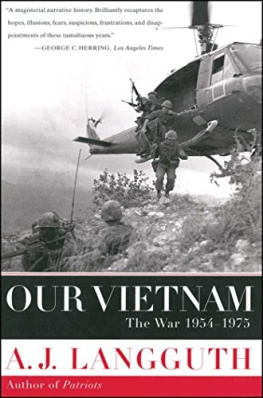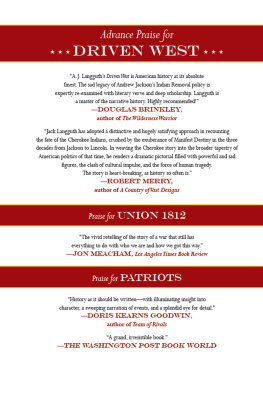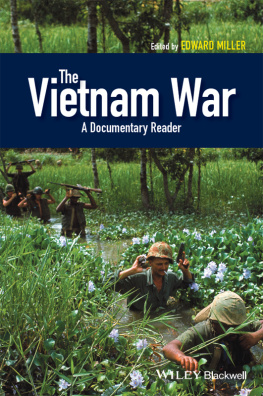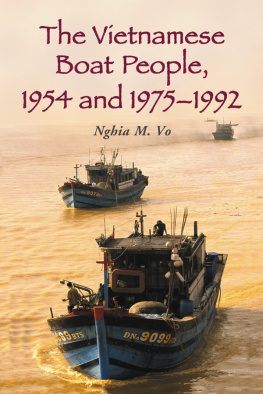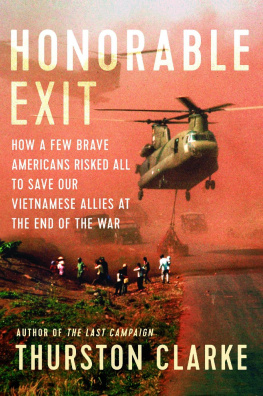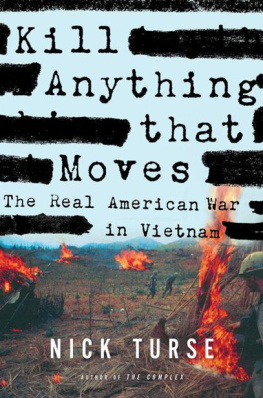JOHN F. KENNEDY AND HO CHI MINH
VO NGUYEN GIAP AND LYNDON B. JOHNSON
RICHARD M. NIXON AND LE DUC THO
LE DUAN AND GERALD R. FORD
CAST OF CHARACTERS
SOUTH VIETNAM
BAO DAI was crowned emperor by France in 1925 at age twelve. He collaborated with the Japanese during the Second World War, served Ho Chi Minh briefly as an adviser in 1945 and was restored as chief of state by the French. Never interested in governing, he was supplanted in 1955 by Ngo Dinh Diem. For nearly three decades, the former emperor was attended by a volunteer equerry, Bui Tuong Minh, nicknamed Tommy.
BUI DIEM, son of a scholarly northern family, served as South Vietnams ambassador to the United States from 1966 to 1972. During the 1968 election, he worked with Anna Chennault to persuade Thieu that Nixon would offer him better peace terms than Humphrey.
DUONG VAN MINH, known as Big Minh because he stood six feet tall, led the Revolutionary Military Council that overthrew Diem in November 1963. He himself was sent into exile after the January 1964 coup of Nguyen Khanh.
HOANG DUC NHA, educated in the United States, became an influential adviser to his cousin, Nguyen Van Thieu.
NGO DINH DIEM (19011963) returned to Saigon from self-imposed exile in the United States to become prime minister of South Vietnam in 1954 after the Geneva agreement divided the country. He replaced former emperor Bao Dai as head of government in 1955 and thwarted the planned unification elections of 1956. After U.S. complaints about his autocratic rule, he was deposed by a junta of his generals and murdered on November 2, 1963, along with Ngo Dinh Nhu, his brother and adviser.
NGO DINH NHU, Diems younger brother, and his wife, Tran Le Xuan, became unpopular with the South Vietnamese people and with Americans in Washington and the U.S. embassy in Saigon for their influence over Diem. Madame Nhu was outspoken against the Buddhist protests of 1963 and the sympathy shown them by U.S. policymakers and the world press. Diem resisted repeated American efforts to limit the role of Nhu and his wife. Three of his other brothers were also influential in Diems government: Ngo Dinh Can controlled the provinces around Hue with a lawless police force and was executed after the 1963 coup. Ngo Dinh Luyen, Diems youngest brother, was his ambassador to Great Britain in the early 1960s. Ngo Dinh Thuc, the Ngo familys eldest son, was the Roman Catholic archbishop of Hue.
NGUYEN CAO KY, born in 1930, became prime minister of South Vietnam in 1965 and its vice president under Nguyen Van Thieu in 1967. Trained by the French military, he broke with Thieu in 1971 and fled the country in April 1975.
NGUYEN KHANH overthrew the leaders of the coup against Diem three months later in January 1964. He proved to be an inept leader and was sent into exile early in 1965.
NGUYEN VAN THIEU, a general trained in the United States who fought for the French, served as president of South Vietnam from 1967 until the Communists took the country in 1975.
TRAN KIM TUYEN, a Catholic with medical and law degrees from French schools in Hanoi, went south in 1954 and ran Nhus secret police. Exiled and then jailed for plotting against Diem, he lived until 1975 under house arrest in Saigon before escaping to England.
TRI QUANG, a Buddhist dissident in South Vietnam, helped to bring down Diem in 1963. He was also a leader in the Struggle Movement against Ky in 1966, but when it was quelled, he withdrew to the An Quang pagoda in Saigon.
NORTH VIETNAM
BUI TIN, a fifty-year-old journalist who was also an officer in North Vietnams PAVN, accepted Minhs surrender at the Independence Hall on April 30, 1975.
DANG VU HIEP, a veteran of Dien Bien Phu, was a political officer in the North Vietnamese army. He served as an adviser to the Vietcong in the Central Highlands, where he remained for ten years. In 1965, Hiep took part in the attacks on Pleiku on February 7 and the Qui Nhon barracks three days later.
HO CHI MINH (18901969) was born Nguyen Sinh Cung in the central Vietnamese province of Nghe Tinh. He joined the French Communist Party in 1920, and formed the Indochinese Communist Party in the early 1930s and a nationalist alliance called the Vietminh in May 1941. The founder of the Democratic Republic of Vietnam, Ho was revered in the North for his commitment to independence and unity.
LE DUAN (19081986) first enlisted in Hos youth movement in 1928 and rose in the Communist ranks. He replaced Truong Chinh as acting general secretary of the Hanoi Politburo in 1956, the same year his pamphlet The Path of Revolution in the South inspired the resistance to Diem. Even before Hos death, Le Duan had emerged as the driving force for southern independence.
LE DUC THO (19111990) became Hanois leading negotiator at the Paris peace talks. He declined the honor when he and Kissinger were awarded the 1973 Nobel Peace Prize because, he said, peace had not yet been established.
LUU DOAN HUYNH joined Giaps army as a seventeen-year-old and held posts in Hanois Foreign Ministry in Southeast Asia before becoming an intelligence analyst for the Department of U.S. Affairs. Huynh was a member of the five-person team that drafted documents for peace talks with the United States.
NGUYEN CHI THANH (19141967) commanded North Vietnamese operations in South Vietnam from 1965 until he died of a heart attack in July 1967.
NGUYEN HUU THO, a southerner, was named chairman of the National Liberation Front in December 1960 and took his orders from the Hanoi Politburo.
NGUYEN KHAC HUYNH, with his fellow high school classmates, tore down the Japanese flag in Hanoi in 1945. He carried the news of the French defeat to fellow troops in 1954 and took part in the Paris peace talks. When Communist soldiers entered Saigon in 1975, Huynh was an analyst in Hanoi with the Foreign Ministry.

